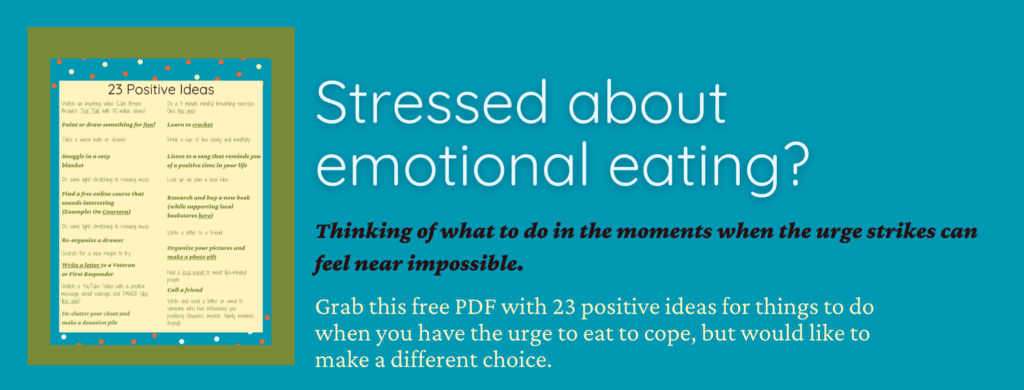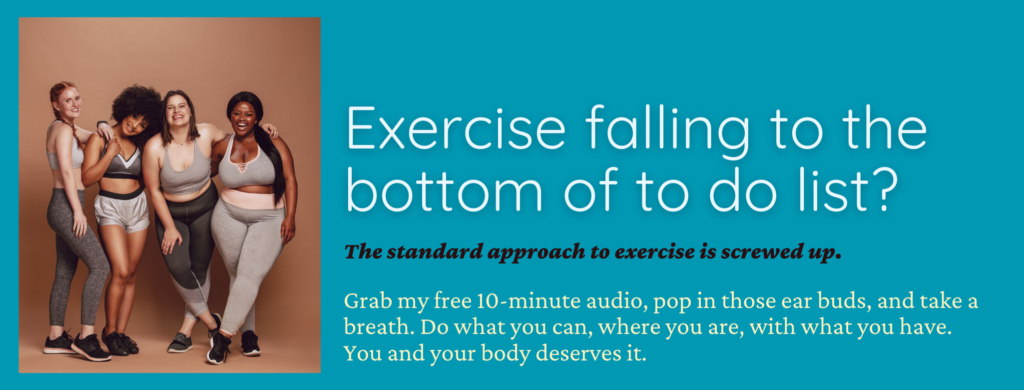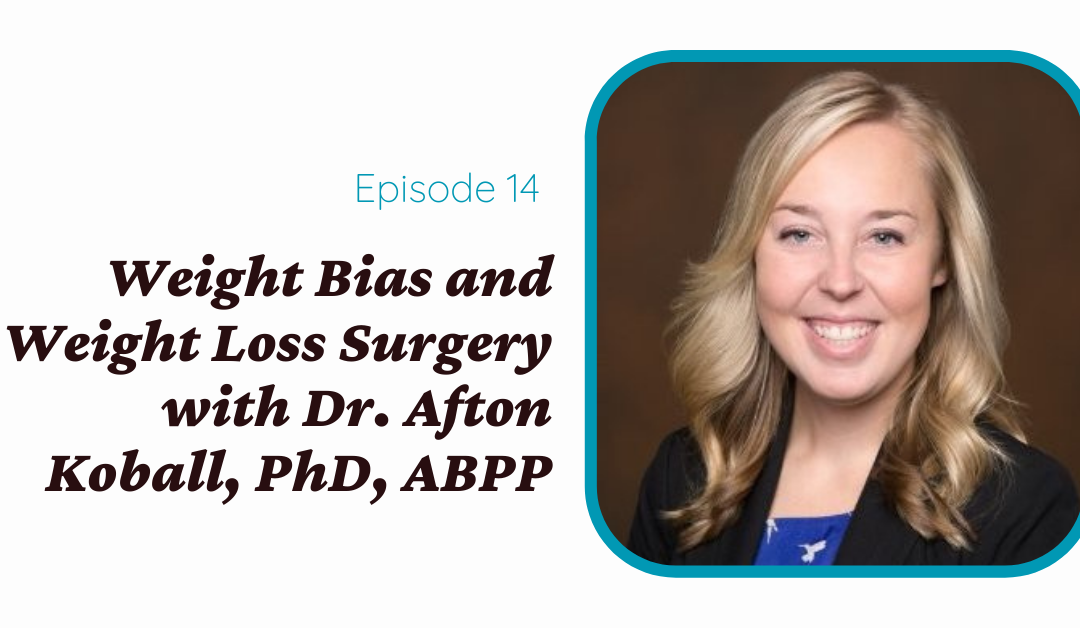Podcast: Play in new window | Download
Subscribe to The Innovative Therapist Podcast! Apple Podcasts | Spotify | RSS | More
Episode 14. Today I had the pleasure of talking with Dr. Afton Koball, a board certified clinical health psychologist with a wealth of knowledge in the areas of behavioral weight management, bariatric surgery, weight bias, motivation, and many other related areas. She obtained her PhD in Clinical Psychology from Bowling Green State University and did internship at Rush University Medical Center and fellowship at the Mayo Clinic.

What to Expect in this Episode
We dive into a lot of topics with Dr. Koball including but not limited to:
- How she got interested in health psychology and the weight management field
- Her difficulties at times with accepting her post-partum body
- What is weight bias
- How Dr. Koball would like to see the field improve as it relates to recommending weight loss surgery
- Ways to improve your relationship with food from an evidence-based approach
Who Struggles with Body Image (Pretty Much, Everyone)
Afton talks about some of her struggles with accepting her body after her third kiddo, even when she feels she “knows better” and knows self-critical thoughts aren’t helpful.
On How We Are Doing as a Field with Helping People Lose Weight
“I think we are doing such a crappy job. I think we have perpetuated this idea in the media and popular culture and unfortunately even in healthcare that weight loss is all about diet and exercise so if you just eat less and exercise more you will lose weight. And if you aren’t losing weight, then something is wrong with you, you’re bad or you aren’t working hard enough or you are lazy.” (In reference to how we are doing as a field with regards to helping people lose weight)
– Dr. Afton Koball, PhD, ABPP
That pretty much sums it up! Just kidding, we dive into more details in the episode.
She talked about how it of course is not bad advice to eat well and move more, but that weight is so much more complicated than we lead people to believe. She mentions our environment, physiology, our stress and yet we pin it all on diet and exercise.
What Aren’t We Talking About
Dr. Koball talked about how much we emphasize “diet and exercise” as the end all be all and we rarely talk about all the other contributors to weight, like physiology, genetics, environment, stress and so many other factors.
Metaphor of Trying to Slow Your Respiratory Rate
She talked about a metaphor equating large amounts of weight loss to trying to slow down your respiratory rate. She talked about how it is possible for a period of time, but since your body was not designed to do that it takes a lot of willpower and effort and energy and you aren’t able to focus on much else.
What is Weight Bias?
We talked about weight bias, which is negative attitudes and stereotypes about people solely due to their weight or body size. And how in some ways we are more stigmatized against larger bodies than every and it can still be one of the more socially acceptable forms of bias.
She discussed weight bias and its association with negative physical outcomes (e.g., weight gain over time, increased stress hormones) and the importance of sharing this information with people, particularly medical professionals.
She talked about even when controlling for all other factors, weight bias still is predictive of early mortality (Sutin, Stephan, & Terracciano, 2016).
The Way We Approach Weight Loss Undermine Key Psychological Needs for Long-Term Change?
Undermining Competence (Feeling effective, “I can do what I set out to do”) and Autonomy (Freedom from excessive pressure to behave in a certain way)
- The messages that a one size fits all works for everyone. This can be particularly problematic for people of higher weights, with medical conditions, or who are debilitated by their weight.
- Focus on what not to do makes people want the foods more.
What Do We Think about the Body Mass Index?
We talked about the very limited utility of BMI. It’s quick and easy to get and we can use it to describe research that has been done in the past. That’s about it.
It has very little clinical utility, and yet, we continue to use it pervasively.
We talked about how the BMI does not really tell us anything about your health, and yet we keep using it and how it can impact people’s sense of self and sense of their health.
Should We Be Recommending Weight Loss Surgery More or Less?
I asked Dr. Koball what she would like the field to see change.
She surprised me by saying she would love to see bariatric surgery more universally recommended and utilized. She went on to describe that not offering surgery could at times be perpetuating weight bias and the idea that diet and exercise “should” lead to weight loss if people are doing it “right.”
She talked about the importance of not tying a person’s worth and body size together and working to uncouple that. She talked about how offering bariatric surgery as a treatment for medical conditions if it’s causing physical disability or severe health problems. She talked about this being anti-weight bias by challenging the notion that diet and exercise is a cure all.
The Power of Differing Views
This conversation really influenced me, ironically. I worked in a bariatric surgery clinic for many years, so I never needed to bring up bariatric surgery as an option there. Everyone there was already considering it or wanted it.
This conversation made me think about how our own individual experiences personally and professionally influence our opinions in these areas. After the recording, Afton and I talked a bit more offline and I talked about how a whole foods plant based diet has been show to reverse disease at times.
How to Fully Support Autonomy
To fully support autonomy for any decision, it’s important that we present options, fully inform folks of the pros and cons without pressure or judgment to make a certain choice. Perhaps we give a recommendation or a guide based on their health history and the outcomes they are likely to get, but no pressure. No message of “this is the only option for you.”
Afton and I discuss how significant dietary changes might impact health outcomes, but may not impact weight.
Ultimately, to support autonomy we should de-stigmatize available options and support an individuals right to pick what feels best for them.
We do miss these opportunities to give full autonomy and choice.
Does Intrinsic Motivation Mean You Will Always Like It?
We talked about how things can get in the way of developing intrinsic motivation. Dr. Koball talked about her love for her work and how she also gets paid for her work and has an annual review coming out and how sometimes those extrinsic factors can reduce our intrinsic motivation.
She gave the example of how at times she has felt intrinsic motivation for exercise but at times desire for weight loss or training for a certain event can reduce her intrinsic motivation for the behavior itself.
We then had a discussion about how intrinsic motivation is not the only type of autonomous motivation. Since we are never going to be intrinsically motivated for everything, values-based action or behaviors that are consistently with your identity is essential.
How Can We Move Towards Improving Our Relationship with Food?
Below are some important things to remember.
- Stop putting pressure on yourself to lose weight.
- Focus on the behaviors, not the outcome.
- Ask, how can you feel more in control or satisfied with the way you are eating?
- Remember that your weight or body size isn’t a moral failure and does not say anything about you as a person.

Disclaimer: This blog and podcast is for informational and educational purposes only. It is not a substitute for individual professional advice or treatment, including medical or mental health advice. It does not constitute a provider patient relationship.
References
Sutin, A. R., Stephan, Y., & Terracciano, A. (2016). Weight Discrimination and Risk of Mortality. Psychological Science, 26.
Disclaimer: This blog and podcast is for informational and educational purposes only. It is not a substitute for individual professional advice or treatment, including medical or mental health advice. It does not constitute a provider patient relationship.
